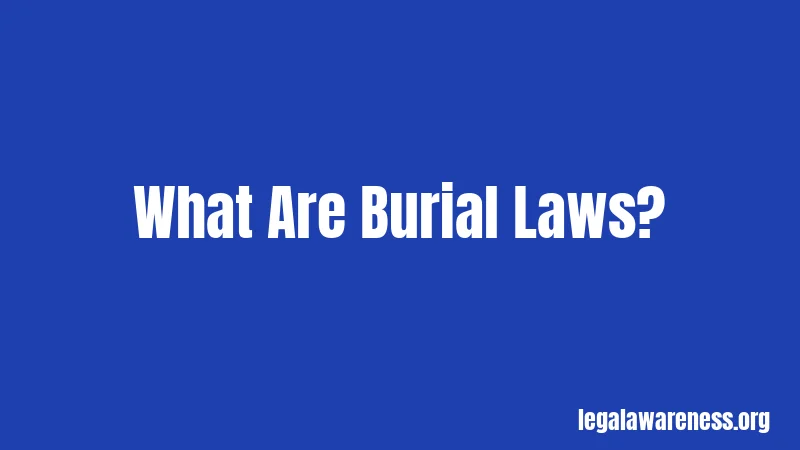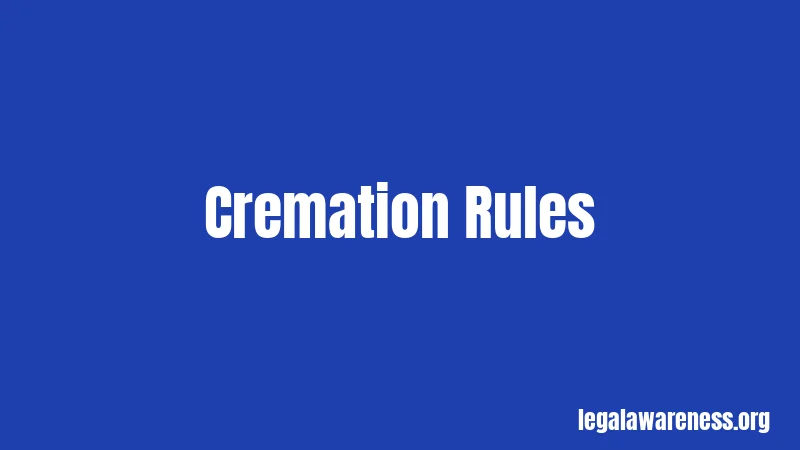Burial Laws in Illinois (2026): Rules You Actually Need
Most people don’t think about burial laws until they have to. Then it hits you all at once. Where can you bury someone? Do you need permission? What happens if you break the rules?
In Illinois, burial laws are way more detailed than you’d think. They cover everything from where you can scatter ashes to what happens if you damage a cemetery. Let’s break down exactly what you need to know.
What Are Burial Laws?

Burial laws control how we handle bodies after death. They exist to protect public health and respect the deceased. Pretty straightforward.
In Illinois, these laws cover burials, cremations, scattering ashes, and even new methods like alkaline hydrolysis. They also regulate cemeteries and funeral homes. The state wants to make sure everything’s done safely and with dignity.
Think of burial laws like traffic rules for the funeral industry. They keep things running smoothly and safely.
Getting a Death Certificate and Burial Permit
Here’s the deal. Before you can bury or cremate anyone in Illinois, you need paperwork. Two pieces specifically.
First, someone has to file a death certificate within seven days of the death. Usually, this is the funeral director. They can’t cremate the body or move it out of state until this certificate is filed. (410 Ill. Comp. Stat. § 535/18)
The only exception? If the death is under investigation by a coroner or medical examiner.
Second, you need a permit for disposition. This is basically permission to transport and bury or cremate the body. The funeral director gets this permit after filing the death certificate. In Illinois, this transport permit is called a “permit for disposition.” (410 Ill. Comp. Stat. § 535/21)
No permit means no burial. No exceptions.
Wondering if you can handle this yourself? You can’t, actually. Only a licensed funeral director can issue these permits and file death certificates in Illinois. The law is strict about this part.
Burial on Private Property

Okay, this surprises people. Yes, you can bury someone on private property in Illinois. Seriously.
There’s no state law that prohibits home burial. But hold on. Before you pick a spot in your backyard, there are rules you need to follow.
First, check with your local county or town clerk about zoning laws. Some areas allow it, some don’t. Residential zones often prohibit burials. You’ll typically need rural or agricultural land.
Second, the burial site must be at least 200 feet from wells or bodies of water. This prevents contamination. Some local ordinances make this distance even stricter.
Third, you need that burial permit we talked about earlier. A funeral director still has to obtain it from the local registrar where the death occurred.
Here’s a smart move. If you bury someone on your land, draw a map showing exactly where. File this map with your property deed. Future owners need to know there’s a burial site there.
Not sure what counts as safe distance from water? Ask your county clerk. They can tell you the specific requirements for your area.
What You Need for a Cemetery Burial
Most people choose traditional cemetery burial. Makes sense.
Here’s what you need to know. You don’t legally need embalming in Illinois. None. Refrigeration works just as well and costs less.
You also don’t need a casket by law. However, the cemetery might require one. Or they might require a burial vault to prevent the ground from sinking. Check with the specific cemetery about their rules.
The funeral director must personally witness the placement of the remains at the cemetery. This is required by law. It ensures the right person ends up in the right place.
Average casket costs? Over $2,000. High-end ones can reach $10,000 to $20,000. If that feels like too much, alternative containers are legal for burial. Just verify with the cemetery first.
Cremation Rules

Cremation has specific rules in Illinois. Pay attention to these.
You cannot cremate a body within 24 hours of death. Period. (410 Ill. Comp. Stat. Ann. 18/35)
The crematory needs two things before they can proceed. First, a cremation permit from the county coroner or medical examiner. Second, a cremation authorization form signed by an authorized person.
Who can authorize cremation? Illinois law lists them in order. The person you named in your will or health care power of attorney comes first. Then your executor. Then your spouse or closest relatives. The list goes on.
Federal law says you can use alternative containers for cremation. Caskets aren’t required. These containers can be cardboard, fiberboard, or unfinished wood. Way cheaper than a traditional casket.
Honestly, this is the part most people miss. Funeral homes sometimes push hard for expensive caskets even for cremation. But the law requires them to tell you about alternative containers.
Scattering Ashes
Sound complicated? It’s actually not.
Illinois law allows you to scatter ashes in several places. You can place them in a cemetery’s designated scattering area. You can use land owned by the Department of Natural Resources. Or you can scatter them “in any manner whatever” on private property if the owner consents. (410 Ill. Comp. Stat. §§ 18/5; 18/40)
Pretty flexible, right?
For water burial, the rules get more specific. The Clean Water Act governs scattering in rivers or lakes. You might need a permit from the state agency managing the waterway. For ocean burial, different federal rules apply.
Want to scatter ashes from a plane? Federal aviation laws prohibit dropping objects that could harm people or property. But cremated remains aren’t considered hazardous. Just remove the ashes from their container before scattering.
Not sure about a specific location? Contact the agency that manages it first.
Alkaline Hydrolysis
This one’s new to most people. Illinois is one of the few states offering alkaline hydrolysis to the public.
Sometimes called “flameless cremation” or “green cremation,” this process uses water, alkali solution, pressure, and heat. It speeds up natural decomposition. What’s left? Bone fragments similar to regular cremation, plus liquid.
The same rules that apply to flame cremation apply here. You need the same permits. The same waiting period. The same authorization.
Some funeral homes in Illinois offer this service. It typically costs about $1,000 more than traditional cremation. But it’s considered more environmentally friendly.
Cemetery Protection Laws
Here’s where things get serious. Illinois takes cemetery protection very seriously.
The Cemetery Protection Act (765 ILCS 835) makes it illegal to vandalize, damage, or desecrate burial grounds. This includes grave markers, fences, vegetation, or any memorial dedicated to the deceased.
What counts as vandalism? Spray-painting headstones. Breaking cemetery fences. Damaging monuments. Pulling up flowers or plants. Even entering with intent to cause damage.
The penalties increase based on how much damage you cause. If the damage is under $300, you’re looking at a Class 3 felony. That’s 2 to 5 years in prison and fines up to $25,000.
If damage exceeds $300, or it’s your second offense, it becomes a Class 2 felony. That’s up to 7 years in prison and $25,000 in fines.
Wait, it gets worse. This is called “institutional vandalism” because cemeteries are protected institutions. Courts don’t go easy on these cases.
Most people don’t realize how strict these laws are. Seriously. Even minor damage can result in felony charges.
Cemetery Registration and Oversight
All cemeteries in Illinois must register with the state. Every single one. (760 ILCS 100/8)
The Cemetery Care Act requires this registration. It ensures cemeteries maintain proper financial records and take care of the grounds. The Illinois Office of the State Comptroller oversees registered cemeteries.
The Cemetery Oversight Act, passed in 2010, adds more rules. Cemeteries must keep detailed records of every burial. They must maintain trust funds for perpetual care. They must register with the Illinois Department of Financial and Professional Regulation.
Environmental standards are enforced too. Cemeteries can’t contaminate soil or groundwater. They must follow specific distance requirements from water sources.
Protecting Old and Unmarked Graves
Illinois protects historic burial sites. The Human Remains Protection Act (20 ILCS 3440) covers this.
This law protects unregistered graves, grave artifacts, and markers over 100 years old. This includes prehistoric mounds. You cannot excavate, vandalize, remove, or disturb these sites in any way.
Violations are either misdemeanors or felonies. The penalties depend on what you did and how much damage occurred.
Found an unmarked grave on your property? Stop immediately. Contact the Illinois Historic Preservation Division. They prefer graves remain undisturbed and preserved in place.
Confused about the difference? Registered cemeteries fall under different rules. Unregistered historic graves get extra protection under this act.
New Chain of Custody Law (2025)
This one just took effect in January 2025. Pay attention.
Funeral homes must now establish detailed “chain of custody” records. They track where remains go from intake to final disposition. This law came after a funeral home in Carlinville delivered wrong remains to over 60 families.
The law requires documentation at every step. When remains arrive. When they’re moved. When they’re prepared. When they’re transported. Everything gets recorded.
Funeral homes that intentionally violate this law face Class 4 felony charges. That’s up to 3 years in prison and fines reaching $25,000.
The Illinois Department of Financial and Professional Regulation must inspect any funeral home within 10 business days if someone files a complaint.
Trust me, this works. It protects families from getting the wrong remains.
Pre-Need Funeral Arrangements
Planning ahead? Illinois has rules for that too.
The Illinois Funeral or Burial Funds Act requires that pre-paid funeral or burial funds be held in trust. The money stays protected until needed. This prevents funeral homes from misusing your payments.
Providers must give you itemized statements of all goods and services before you sign anything. No hidden fees allowed. Complete transparency is required by law.
If a funeral home mismanages pre-need funds, they can face civil penalties up to $5,000 per violation. Additional fines apply for ongoing problems.
Honestly, this law makes sense. It protects consumers who pay for funerals years in advance.
Who Has the Right to Make Funeral Decisions?
Illinois law is very specific about who can make funeral arrangements. The order matters.
First priority goes to anyone you named in your will, prepaid funeral contract, health care power of attorney, or cremation authorization form. You control this while alive by putting it in writing.
If you didn’t name anyone, next comes your executor or legal representative. Then your surviving spouse. Then your adult children. Then your parents. The list continues through siblings, then more distant relatives.
If nobody in your family can or will take responsibility, certain organizations can step in. Religious groups, community organizations, or fraternal organizations willing to handle legal and financial responsibility.
Literally, the law covers every possible scenario.
Religious and Cultural Accommodations
Illinois law respects religious customs and cultural practices around burial.
Some religions require burial within specific timeframes. Illinois accommodates this. Registrars must issue permits for disposition quickly enough to allow Sunday or holiday burials when needed.
Religious burial customs that don’t violate public health standards are generally allowed. The state balances religious freedom with safety requirements.
During public health emergencies, temporary regulations might change some procedures. For example, COVID-19 brought restrictions on funeral attendance and social distancing requirements. These protected public health while still ensuring dignified handling of remains.
Consumer Protection Rules
The law protects you from unfair funeral practices. Here’s how.
Federal and state laws require funeral homes to give you price lists. Itemized price lists. Before you agree to anything.
You can buy a casket from anyone. Funeral homes must accept caskets purchased elsewhere. They cannot charge handling fees for caskets you didn’t buy from them.
You can choose only the services you want. Funeral homes cannot require you to buy packages or unwanted items.
If you have complaints about a cemetery, funeral director, or crematory, contact the Illinois Department of Financial and Professional Regulation. They handle oversight and enforcement.
Pretty straightforward. The law tries to prevent funeral homes from taking advantage of grieving families.
Penalties for Violations
Breaking Illinois burial laws brings serious consequences. Let’s be clear about what happens.
Operating an unregistered cemetery? Fines up to $10,000 per violation. Plus potential legal injunctions forcing you to stop.
Mishandling pre-need funeral funds? Up to $5,000 per violation in civil penalties.
Damaging cemetery property? Class 2 or Class 3 felony charges. Prison time and heavy fines.
Violating the new chain of custody law? Class 4 felony. Up to 3 years in prison and $25,000 in fines.
Not getting proper burial permits? Criminal charges. The specific penalty depends on circumstances.
Most people get this wrong. They think burial violations are minor infractions. They’re not. Illinois takes these laws seriously.
What to Do When Someone Dies
Okay, pause. Read this carefully. Here’s your step-by-step guide.
First, contact a licensed funeral director. They’ll handle most legal requirements for you. You legally need them for permits and paperwork.
Second, they’ll file the death certificate within seven days. This must happen before cremation or burial.
Third, they’ll get the permit for disposition from the local registrar.
Fourth, decide on burial, cremation, or another method. The funeral director explains options and costs.
Fifth, if burying on private property, verify local zoning laws first. Get permission from the county clerk.
Sixth, if scattering ashes, check rules for your chosen location. Get any needed permits.
Wondering if this takes long? The seven-day window for death certificates gives you time. But don’t delay making basic decisions.
Special Situations
Some situations need extra attention. Here are a few.
If death occurred under suspicious circumstances, the coroner or medical examiner investigates first. This delays permits and cremation. Nothing happens until they complete their investigation.
If you’re donating a body to medical science, different rules apply. The institution needs proper permits before accepting the body.
If you’re transporting remains out of state, you need interstate permits. The funeral director handles this but charges fees.
If someone dies with no family or money, the county or state might handle burial. They follow the same basic laws but use simplified procedures.
Repatriated war dead get special permits and procedures. There’s a specific process for handling these remains.
Records and Documentation
Keep good records. Seriously.
If you bury someone on private property, file a map with your property deed. Include the exact location. This becomes part of public record.
Keep copies of all permits, death certificates, and authorizations. You might need them later for legal purposes.
Cemetery operators must maintain permanent records of all burials. These records transfer if the cemetery changes ownership.
Death certificates are needed for many things. Transferring property. Accessing bank accounts. Filing insurance claims. Get multiple certified copies.
Frequently Asked Questions
Can I be buried on my own property in Illinois?
Yes, but check local zoning laws first. The site must be at least 200 feet from water sources. You still need proper permits from a funeral director.
Do I need embalming in Illinois?
No. Illinois law doesn’t require embalming at all. Refrigeration is a legal alternative that costs less.
How long do I have to file a death certificate?
Seven days from the date of death. This must happen before cremation or moving the body out of state unless the coroner is investigating.
Can I scatter ashes anywhere I want?
Not exactly. You can scatter on private property with owner permission, in designated cemetery areas, or on certain state lands. Water burials need permits. Always check specific location rules first.
What happens if I damage a cemetery?
You face serious felony charges. Even minor damage under $300 is a Class 3 felony with 2 to 5 years in prison and fines up to $25,000. Damage over $300 or repeat offenses bring Class 2 felony charges.
Final Thoughts
Now you know the basics. Illinois burial laws protect public health and honor the deceased. They’re stricter than most people realize.
Need to make burial arrangements? Work with a licensed funeral director. They know the current laws and handle required paperwork.
Planning ahead? Put your wishes in writing. Name someone to make decisions. This prevents family conflicts later.
When in doubt, ask questions. Contact your county clerk about zoning. Contact the state agencies about permits. Contact funeral directors about options.
Stay informed, stay legal, and treat these matters with the seriousness they deserve.
References
- Illinois Compiled Statutes – Vital Records Act (410 ILCS 535)
- Illinois Department of Public Health – Death Certificates and Permits
- Illinois Compiled Statutes – Cemetery Protection Act (765 ILCS 835)
- Illinois Compiled Statutes – Cemetery Care Act (760 ILCS 100)
- Illinois Department of Financial and Professional Regulation – Cemetery Oversight
- Illinois Historic Preservation Division – Cemetery Laws
- Nolo Legal Encyclopedia – Illinois Burial and Cremation Laws
- Illinois Compiled Statutes – Human Remains Protection Act (20 ILCS 3440)
